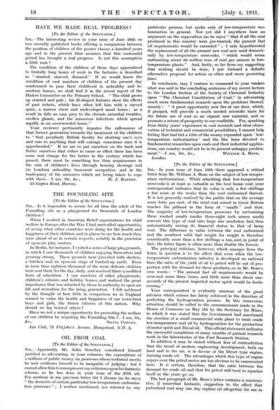HAVE WE MADE REAL PROGRESS? .
[To the Editor of the SPECTATOR.] SIR,—The interesting review in your issue of June 20th on two recently published books offering a comparison between the position of children of the poorer classes a hundred years ago and in the present time assumes that this centennial period has brought a real progress. Is not this assumption a little rash ?
The condition of the children of those days apprenticed to brutally long hours of work in the factories is described as "stunted, starved, diseased." If we would know the condition of vast numbers of children of the Present day condemned to pass their childhood in unhealthy and in- sanitary homes, we shall find it in the recent report of the Hadow Committee on the Primary School. "The child grows up stunted and pale ; his ill-shaped features show the effects of past rickets, which have often left him with a curved spine, a narrow chest and undeveloped nasal bones ; as a result he falls an easy prey to the chronic catarrhal troubles, swollen glands, and the numerous infections which spread rapidly in an overcrowded home."
Your reviewer pertinently imputes the callousness- of that former generation towards the treatment of the children to "that peculiarly British faculty for shutting one's 'eyes and ears to anything that will outrage conscience once it is apprehended." If we are to pat ourselves on the back and flatter ourselves that either in cause or effect there has been some real change for the better in the century which has passed, there must be something less than acquiescence in the ruin of children's lives through housing shortage and (in London) unhealthy basement occupation, and in the inadequacy of the measures which are being taken to cope










































 Previous page
Previous page